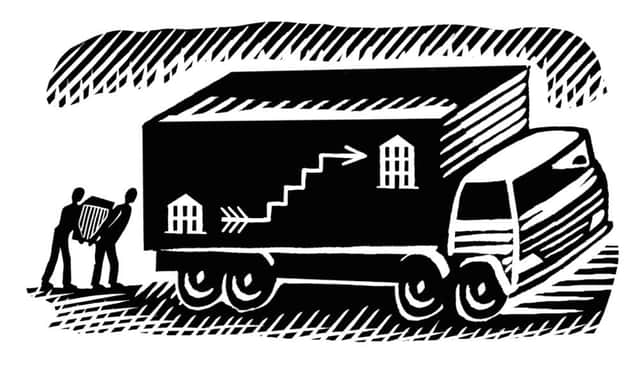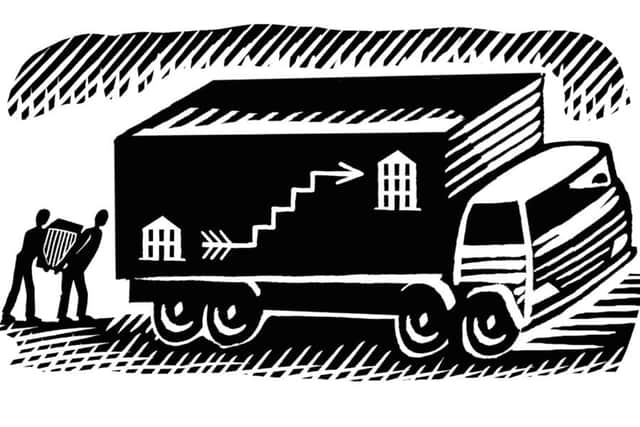44 Scotland Street: A selfish climber


During that period, Matthew and Elspeth found themselves owners of two properties – a situation that for most people is made distinctly uncomfortable by the need to have a bridging loan between mortgages. For a brief spell interest is paid not only on the old mortgage but on the new loan too – a potentially crippling burden. People on bridging loans can be seen in restaurants eating only one course or, indeed, nothing at all, so pressing is the enforced parsimony a bridging loan entails.
In Matthew’s case, such exigencies were unnecessary, as he had found the purchase price of the new house from capital – an unusual position for one in his late twenties to be in. But even so, being insulated from harsh economic reality does not mean that one is unaware of the stringencies under which most people live.
Advertisement
Hide Ad“How does anybody do it?” he remarked to Elspeth as they sat in their kitchen in India Street, amidst the half-packed crates of pots and pans, cutlery and crockery.


“It helps to have packers,” said Elspeth. “Those guys move in – bang, bang – and everything’s wrapped up in crumpled newspaper and stacked away.”
“Not that,” said Matthew. “I meant financially, but since you mentioned it, what if you can’t afford movers? What do you do?”
Elspeth looked at him. There was the odd occasion – such as now – when the difference in their backgrounds showed. Had Matthew never done a flat move as a student? Had he been able to afford removal men even then?
“You pack everything yourself,” she said. “But it depends on how much stuff you have. Lots of people don’t have all that much stuff, you know.”
“Oh, I know that,” said Matthew. He was sensitive to any suggestion of privilege.
Advertisement
Hide Ad“Then you hire a van,” Elspeth went on. “And you get your friends to help.”
“Of course.”
Elspeth continued. “There’s a certain stage in your life, though, when you realise that you’re not going to help anybody else to move. You say to yourself: that’s it – no more helping friends with their move.”
Advertisement
Hide AdMatthew smiled. He had done that; only a few months ago he had declined an invitation to have a drink with a friend when the friend had casually added to the invitation that there was wardrobe that needed shifting afterwards.
“It comes at about twenty-eight,” Elspeth continued. “You turn twenty-eight and you decide that you’ve helped enough friends to move flats. And that’s the point at which you say …”
“My back,” interjected Matthew.
“Exactly. You say: Sorry, I’ve got this back, you see. It always works.”
Matthew looked thoughtful. ‘There’s a limit to what one can do for friends – whether or not you have a tendency to put your back out.”
Elspeth agreed. “Of course some people are so selfish they’ll do nothing for others – even for their friends.”
Matthew thought about this. He had several very generous friends – their names came to him quite readily – but it was difficult to call to mind entirely selfish ones. But then he remembered. “Yes,” he said. “I knew somebody like that. I remember driving with her up to Fort William once – we both belonged to a climbing club at university. We were going somewhere up there – I forget exactly which mountain we were going to climb –it wasn’t Ben Nevis.”
Advertisement
Hide Ad“I’m not sure I would want to climb with a selfish person,” mused Elspeth. “She’d let go of the rope rather than try to save you – if you fell, that is.”
“It’s unusual to find a selfish climber,” said Matthew. “Generally speaking climbers help one another. But this woman, well …”
Advertisement
Hide AdHe related to Elspeth how they stopped at Tyndrum, before the road began its ascent to Rannoch Moor and to Glencoe beyond. He told her how in the car park of the Green Welly they had sat down to an improvised picnic lunch. Matthew had gone into the shop to buy some food, and had returned with ready-made sandwiches and two apples. He had offered his companion a sandwich and he had seen her glance discreetly at the sell-by date on the packaging. One sandwich was fresher than the other – and it was this one she chose. Then she had turned to the apples and again he had seen a quick appraisal of desirability before she left him with the smaller and less inviting of the two.
“In those two quick glances she gave herself away,” he said. “She said everything about her personality that needed to be said, and I realised that I was in the company of a consummately selfish person.”
Elspeth agreed. “Imagine giving somebody else the older sandwich,” she said. “A good person would not have done that, would she?”
“No,” said Matthew. “She would not.”
“Where does generosity come from?” Elspeth asked.
It was a strange question, and Matthew wondered whether the same question might be asked of any of the virtues. “I suspect that generosity is determined at a very early age,” he said. “Probably in one’s very earliest years, and then it becomes cemented through the habits of the heart.”
“Like everything else,” said Elspeth. “Like kindness; like sympathy; like the ability to think yourself into the shoes of another.”
“Yes,” said Matthew. “Like all of that.”
“Mind you,” said Elspeth. “Our characters are partly a matter of genes, aren’t they?”
“Could be.”
Advertisement
Hide Ad“I think they are. You know, when I was doing my teaching qualification we were advised to read a book on twins. It was fascinating. It was all about those studies in which twins who are separated at birth and who have had totally different upbringings are later assessed by psychologists. And you know what? They are often remarkably similar in their behaviour and their preferences.”
“Really?”
“Yes. In one case two men turned up who had not seen one another since birth. They were twins who had been adopted by different families. And when the researchers saw them in their thirties or whatever age they were, they wore similar clothes, voted for the same party, watched the same movies, had the same hobbies, and drove the same make of car.”
“No!”
Advertisement
Hide Ad“Yes. And there was something else – they had each married a woman with the same first name.”
“Well!” exclaimed Matthew.
“Yes,” said Elspeth. “So much for the idea that nurture beats nature.”
“Oh,” said Matthew, vaguely depressed at the thought that our fate was so much a question of deoxyribonucleic acid.